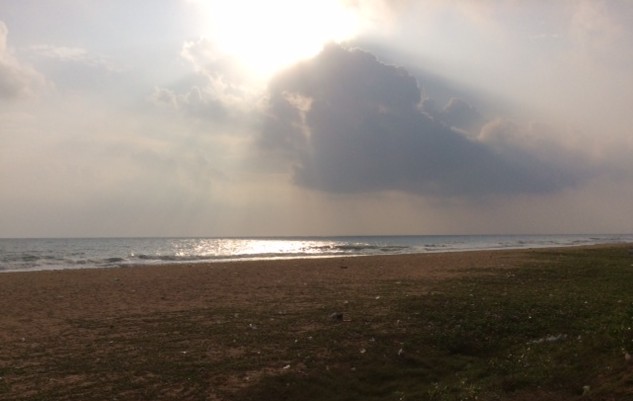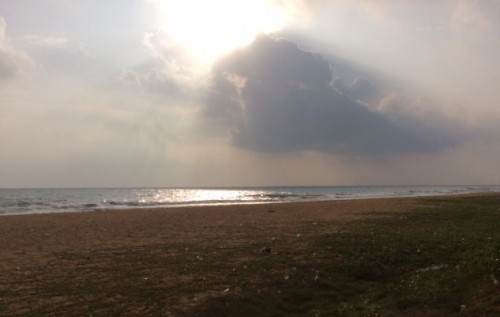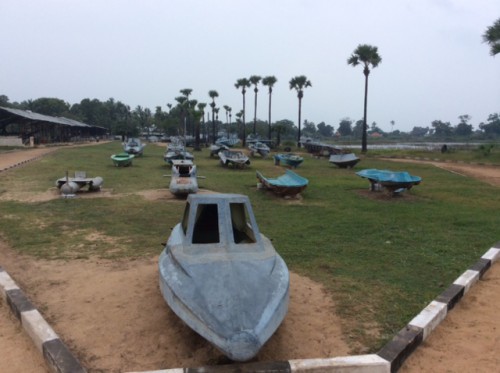19th February 2015 Colombo, Sri Lanka
A visit to the Vanni

Earlier this week, the UN Human Rights Council agreed to Prince Zeid’s request to defer consideration of his office’s investigation into the end of the conflict in Sri Lanka to the summer. The UK was a main sponsor of the resolution setting up the investigation and we remain committed to it.
Those who provided information to the investigation – and especially those who did so in the face of intimidation – may find the delay difficult to accept. But it was the right thing to do: the new Sri Lankan government has committed itself to a change in approach towards domestic accountability, reconciliation and cooperation with the UN. Progress on these issues is essential to addressing the legacy of the conflict, and to building the strong, independent domestic institutions necessary to address the grievances and needs of the many victims of violations over many years in Sri Lanka.
I’m just back from a few days in the Vanni, my first opportunity to visit this former LTTE stronghold and the theatre for the last weeks of the conflict in 2009. Unlike in the rest of Sri Lanka, it is impossible to ignore how recent the end of the conflict was and how raw some of the scars remain. Shuttling along the – now excellent – roads, I still saw many buildings with shell and gunfire damage. There are really a lot of military memorials. The LTTE’s former killing power is also clear to see.
It’s not so easy to find private businesses operating, though army welfare shops are everywhere. It’s obvious why many people complain that they are undermining small scale shop keepers. Determined to support the local economy, we checked into a private guest house in Mullaitivu. Five minutes later, I was supporting the local economy still further by investing in a set of new sheets and rubber flip flops. Sometimes you pay for your principles… The local restaurant was excellent, though, and well patronised. There are some visionary companies like MAS operating in the Vanni, providing much needed jobs and helping to create a culture of labour. It is excellent news that a couple of others are now taking the plunge – the Vanni needs more investment, large and small – and that Foreign Minister Mangala has said that the army is withdrawing from civilian activities.

The need to grieve and to know what happened to missing loved ones remains overwhelming. I met ex-combatants who were socially and economically excluded. Promised releases of political prisoners are slower than people would like. I also met several of our project partners and members of civil society: people and organisations working on issues from governance to domestic violence to youth empowerment. The British Government will be spending over £2 million next year to support reconciliation and reform. The needs remain significant, but, as ever, it was inspiring to hear our partners’ stories and commitment. And it was reassuring, too, to hear accounts of how responsive the police had been to reports of electoral malpractice in January.
My visit coincided with the Sri Lankan Government’s decision to release over 1,000 acres of land in the Palali High Security Zone in Jaffna. When fully implemented, this will be a very welcome development, allowing people to return to their livelihoods and move into a more sustainable period of their lives. It will also then be an example of the government of Sri Lanka having responded to the needs of victims. They have a window now to demonstrate this kind of commitment, to enable further information exchange, and to work with the broadest possible spectrum of civil society groups, domestic and international actors on reconciliation and accountability.
I want to finish with a wholly optimistic image, symbolic of wider hope for the North. At the recent Classic Car Club of Ceylon’s British Day, I met an extraordinary Jaffna survivor.
This 1920s Morgan, only the 25th car ever to be registered in Jaffna, was discovered in pieces in a shed at the end of the conflict. Patience, understanding and painstaking attention to detail have put her back on the road, better than new.


Thanks to everyone for reading and commenting, both on this site and others carrying this blog. In the last fifty days, the Sri Lankan Government has made some welcome gestures, including the Independence Day Peace Declaration, the invitation to UN Human Rights Council Rapporteurs and Working Groups and progress on long-awaited legislation such as Witness Protection and Right to Information. But the trust deficit is so significant that these gestures need urgently to be converted into change on the ground, on both reconciliation and accountability. That’s the balance I was hoping to strike.
Wigneswaran’s Geneva project gathers momentum
March 3, 2015, 5:35 pm
article_image
by Shamindra Ferdinando
With the Geneva-based United Nations Human Rights Commission (UNHRC) delaying the release of the war crimes report, on Sri Lanka, till Sept, 2015, at the behest of the US, those who had been wanting to haul the country before an international war crimes tribunal have launched a fresh propaganda campaign. The UK is playing a pivotal role in the project.
In the wake of Minister of State for the Foreign and Commonwealth Office, Hugo George William Swire, warning that Sri Lanka wouldn’t be given a further extension to explain its conduct during the war, UK Deputy High Commissioner in Colombo, Laura Davies, declared that those who had provided information to the UN investigation and, especially those who did so in spite of intimidation, would find the delay difficult to accept. Having declared that it was the right thing to do, Ms Davies appreciated the new Sri Lankan government’s commitment to a change in approach towards domestic accountability, reconciliation and cooperation with the UN. She also appreciated the new government’s promise to release 1,000 acres currently held by the Security Forces headquarters, in Jaffna.
Ms Davies was commenting on the post-war situation here following a recent visit to the Vanni.(http://localhost:8888/lauradavies/2015/02/19/a-visit-to-the-vanni/). The British official’s statement received wide coverage in the Sri Lankan print and electronic media.
Perhaps, the UN and Western powers, too, could now change their attitude towards Sri Lanka.
The UK bending backwards, to appease the British voters of Sri Lanka origin, is not a new phenomenon.
One-time UK Foreign Secretary David Miliband’s campaign to champion international intervention in Sri Lanka during the last phase of the Sri Lankan offensive, was driven largely by the need to win the votes of the UK’s large Sri Lankan Tamil population. We wouldn’t have known this if not for Wikileaks.
Richard Mills, a political officer at the US Embassy, in London, quoted Tim Waite, a Foreign Office team leader on Sri Lanka, as having said: “…with the UK elections on the horizon and many Tamils living in Labour constituencies, with slim majorities, the government is paying particular attention to Sri Lanka.”
“Waite said that much of [Her Majesty’s government] and ministerial attention to Sri Lanka is due to the ‘very vocal’ Tamil diaspora in the UK, numbering over 300,000, who have been protesting in front of parliament since 6 April, 2009,” Richard Mills, reported.
The UK is pushing Sri Lanka on the accountability issue, in the backdrop of the UK delaying the release of its own domestic war crimes probe into the illegal 2003 invasion of Iraq until the end of May, 2015, general election. It would be pertinent to mention that the legality of the US-UK led invasion on the basis of ‘sexed intelligence reports’ regarding Weapons of Mass Destruction (WMDs) in Iraq had been questioned by no less a person than Deputy PM, Nick Clegg, in 2010, on more than one occasion. The UK never explained its failure to locate WMDs, hence the inordinate delay in releasing the Clilcot war crimes report is understandable.
The British media quoted Clegg as having said:” I don’t think the legality of that invasion has been proven.”
Ms Davies declared: “The need to grieve and to know what happened to missing loved ones remains overwhelming. I met ex-combatants who were socially and economically excluded. Promised releases of political prisoners are slower than people would like.”
Ms Davies also complained about the army-run shops in the Vanni. She said: “The LTTE’s former killing power is also clear to see. It’s not so easy to find private businesses operating, though army welfare shops, are everywhere. It’s obvious why many people complain that they are undermining small scale shop keepers.”
Having returned to Colombo, Davies paid a courtesy call on Deputy Foreign Minister, Ajith P. Perera.
Due to the previous government’s failure to challenge those who had been propagating highly exaggerated war crimes accusations, the Geneva-based United Nations Human Rights Council (UNHRC) was able to build up an extremely strong case.
Northern Province Chief Minister, retired Supreme Court judge, C.V. Wigneswaran, wouldn’t have dared to move Geneva against Sri Lanka over genocide of Tamils since 1948 if the previous government responded effectively to propaganda. Now that Ms. Laura Davies has raised the issue of those who had risked their lives to provide information, regarding war crimes allegations, the writer would like to discuss the circumstances under which the UNHRC launched an external investigation in mid last year. The probe got underway under the supervision of Ms. Sandra Beidas, a British national, formerly with the London headquartered Amnesty International.
The culpability of the British government had never been questioned by Sri Lanka, or those demanding accountability for war crimes atrocities. Let Ms Davies explain the circumstances under which the LTTE’s one-time ideologue, Anton Balasingham had received status of a British citizen. The British rewarded Balasingham with citizenship for being an employee at its High Commission in Colombo. In spite of Balasingham supervising the LTTE’s project of death and destruction, the British never felt the need to withdraw his passport. Balasingham died a British citizen in late 2006 of cancer. His Australian -born wife, Adele, who had been deeply involved with the LTTE, now lives in the UK. Today, defeated British Labour Party politician, Joan Ryan, functions as the Chief Executive of the UK headquartered Global Tamil Forum (GTF).
The right of the UN to inquire into allegations, or gross abuses of civilians, during war or post-conflict period, cannot be challenged. The writer is of the firm belief that Sri Lanka should fully cooperate with the UN to facilitate an investigation and punish those who had perpetrated war crimes, regardless of the perpetrators nationality. But, let those governments responsible for Sri Lanka’s tragedy explain their conduct before an international tribunal. The accountability of the British is as serious as that of India being responsible for launching a terrorist campaign against the then President JRJ. Sri Lanka should set the record straight.
Having visited the Vanni, in the wake of CM Wigneswaran accusing Sri Lanka of genocide of Tamils, Ms. Davies proudly declared that the UK had been among the main sponsors of the external investigation, consequent to resolution 25/1. Since her arrival in Sri Lanka, Ms Davies had visited former war zones, including a visit to the Eastern Province, and declared “… it’s a matter of great regret to us that the Government of Sri Lanka is not cooperating more fully with a report which is intended to look at allegations against all sides involved in the conflict. But we have absolute confidence in the investigation team’s ability to source and validate its own testimony.”
Let me examine some of major flaws in the recently concluded UN investigation. This was due to the probe supervised by Ms Beidas, being obviously based on ‘Report of the Secretary General’s Panel of Experts on Accountability in Sri Lanka’, released on March 31, 2011.
= The UNHRC accepted that report without giving the war-winning Sri Lankan government an opportunity to verify allegations contained therein. In fact, the three-member panel, comprising Indonesian Marzuki Darusman (Chairman), American Steven R. Ratner and South African Yasmin Sooka, recommended that accusers shouldn’t be subjected to scrutiny, under circumstances, for two decades, with effect from March 31, 2011. In other words, the defendant, in this case the government of Sri Lanka wouldn’t have an opportunity at least to verify these allegations until March 31, 2031. But again the UN Office of Legal Affairs (OLA) decreed that even after the period covered by the confidentiality clause, release of data would be subjected to a declassification review. The three-member panel declared: “…nearly all of the panel’s substantive records will be classified as strictly confidential with, in some cases, additional protections regarding future use.”
The previous government, for some strange reason, never really questioned the validity of this directive. There had never been a reference to this ridiculous recommendation when Sri Lanka addressed Geneva, since the release of the panel report.
In accordance with the OLA directive, identities of 2,300 persons, who provided information to the panel, would remain classified until at least March 31, 2031.
Now that Ms Davies had commented publicly on the feelings of those who had gone before the panel in the wake of UNHRC delaying the war crimes report, it would be pertinent to ask the British HC whether it would accept accusations as regards Iraq war unless the identity of accusers are known. Obviously, the British government didn’t care to heed its own Deputy Prime Minister Clegg’s declaration that invasion of Iraq was illegal.
In September this year, the UN will again declare that identity of eyewitness to war crimes and other accusers will remain classified for a certain period. Would it be two decades or more?
But perhaps, the most important question is whether at least a couple of those who had complained to the Darusman panel, as well as Ms. Beidas team responsible for the external investigation in line with resolution 25/1 (UN declined to name the investigators for security reasons). The previous government simply played into the hands of the UN by refusing to cooperate. Had the then government invited the UN, Sri Lanka wouldn’t have been in this predicament.
For want of an efficient mechanism, the previous government struggled on the human rights front. The government never challenged various interested parties from inflating the number of dead in accordance with their overall objective to drag Sri Lanka before a war crimes tribunal. Now the likes of CM Wigneswaran and Northern Provincial Council member, Ananthi Sasitharan, wife of a hardcore LTTE cadre, are accusing Sri Lanka of genocide, since 1948.
= Having accepted unsubstantiated allegations as regards the number of dead during the final phase of the offensive on the Vanni east front, the UN dismissed its own findings pertaining to the same. The Darusman panel rejected the report, though all information therein could have been verified. Perhaps, the Deputy British High Commissioner, Ms. Davies, hadn’t been briefed of this particular report, prepared during the war.
The writer had an opportunity to meet Ms Davies when she took up her new posting in Colombo after the conclusion of the conflict.
The Darusman panel couldn’t have accepted the UN report prepared by those who had been on the ground, in the Vanni, during the conflict, without jeopardizing its own report, as well as the much – talked – about ‘Sri Lanka’s Killing Fields’ telecast by British television station, Channel 4. One wouldn’t have to be a rocket scientist to know that the painstakingly prepared ON THE SPOT UN report could have caused a debilitating setback to Darusman, as well as the Channel 4 case against Sri Lanka. In fact, the UN report could have exposed all those who had been propagating lies, as regards the number of dead. The UN report estimated the number of dead and wounded at 7,721 and 18,479, respectively, from August, 2008, to May 13, 2009, whereas the Darusman and Channel 4 declared over 40,000 massacred, within a matter of days, in May 2009. Darusman and Channel 4 alleged that all 40,000 dead were civilians, whereas the UN ground report stated that its figures included both civilians and combatants.
The UN mission in Colombo admitted that it couldn’t maintain records only for six days (May 14 to May 19 due to intensity of fighting). The war ended on the morning of May 19, 2009.
The vast discrepancy in the number of dead, as reported by the UN mission here, and Darusman, should be examined with an investigation carried out by Amnesty International. The AI estimated that during the final months at least 10,000 civilians had been killed. The AI revelation was made in September 2011, in a special report titled “When will they get justice?” released in Sept. 2011, over two years after the conclusion of the war.
=Long standing LTTE supporter Siobhain McDonagh (Mitcham and Morden) (Labour), told the House of Commons, on Sept. 15, 2011, that Sri Lanka’s war, in its last five months alone, had claimed the lives of 100,000 people, 40,000 of them civilians. The lady didn’t respond to The Island queries regarding her assessment, while the British HC declined to comment whether the politician sought any clarification from the mission as regards war dead. The previous government made a genuine effort to counter LTTE propaganda emanating from the British parliament, though massive amounts of taxpayers money was squandered on costly US and UK PR firms.
The GTF decision to hire defeated Labour politician, Joan Ryan, as its Chief Executive, a couple of years back, exposed the growing relationship between the British and the powerful Diaspora groups. Ryan had been accused of financial fraud during her tenure as a member of the British parliament and was perhaps in need of financial support, hence her decision to join the GTF.
The previous government hadn’t been really bothered about the UN approach. The government never officially objected to Darusman leaving out the most significant document which could prove that there had never been deliberate massacres of civilians as the army fought its way across the Kandy-Jaffna highway towards the eastern coast. The UN ground report dealt with the situation in both western and eastern parts of the Vanni over a period of ten months (Aug 2008-May 2009).
Unfortunately, the previous government had been always on a denial mode. Instead of working with the UN, the government refused to cooperate, thereby played into the hands of those who had been working overtime to exploit the situation.
=CM Wigneswaran’s letter never made any reference to the UN ground report that dealt with the situation in the Vanni, from Aug, 2008 to May 2009. The retired judge should have urged the UN to release the still classified report. Those alleging Sri Lanka of genocidal war had conveniently forgotten that the ICRC was allowed to evacuate the war wounded, regardless of their status, until May 9, 2009. According to records available with the ICRC, once overland access to the eastern part of the Vanni had been cut off due to fighting, the ICRC launched a special operation to evacuate the wounded. The project got underway on Feb. 10, 2009, and ended on May 9, 2009. During this period, ships chartered by the ICRC, evacuated 14,000 wounded persons and their relatives. The government allowed the expatriate ICRC staff to come ashore every time a ship returned to the war zone to evacuate the wounded. India can vouch for this operation as a fully fledged Indian medical team operated at Pulmoddai to take care of the wounded.
Would a government, planning genocide, allow the wounded to be evacuated and some foreign passport holders including at least one British national, captured on the battlefield, to be evacuated. One such British national appeared on a documentary, telecast by Channel 4. ICRC ships also delivered food stocks, though the amounts wouldn’t have been sufficient, but the collapse of the distribution network could have deprived people of food even if additional food stocks had been available on the ground.
Successive governments, in Sri Lanka, ensured that people living in the Jaffna peninsula, received adequate food stocks by sea for many years when the LTTE blocked the overland route to Jaffna. The government, throughout this period, dispatched ships in spite of the LTTE, sometimes, attacking vessels carrying food for Jaffna Tamils. Sri Lanka also paid public servants as well as pensioners living in areas under LTTE control, though the LTTE taxed them.
If successive governments envisaged genocide, the UNP would have stopped paying public servants and pensioners perhaps after the eruption of Eelam War II, in June, 1990, during Ranasinghe Premadasa’s tenure as the President. Premadasa lost the entire Vanni region as well as civilian centers in the Jaffna peninsula, hence there wouldn’t have been any requirement to look after those living in areas, under LTTE control, if genocide was the name of the game.
To be continued on March 11
Madam, you are mixing Sri Lanka’s current Political changes with its Warcrimes and Genocide of Tamils Accountability issue. The Sri Lanka government may be new but the people in power are not. The same people who assisted or taken part in Genocide of Tamils. They will NEVER carry out a truthful investigation. We witnessed it for years. You trusted & supported the previous Government of SriLanka’s LLRC. Did the new GoSL said a word about their Sinhalese Armed Forces or Rajapaksa’s involvement in WarCrimes Genocide? How can you believe them or expect them to investigate their own crimes? Sri Lanka wants no credible investigation but wants to tick the boxes as Domestic Investigation in progress at UN, so they can shelve it forever. Justice & Accoubtability are most important regardless of who is in power in Sri Lanka. If you believe & let SriLanka to have Domestic Investigation then Britain also responsible for denying Justice for Tamils. Don’t get confused. Keep your political & diplomatic relations with SriLanka away from Truth & Justice which can be achieved ONLY by International Investigaltion.
Its great
It would be great if troops reduce their presence in civilian activities and concentrate on developing the region
It would be better if the Military build hotels and own them but train Tamil youth and employ them in those hotels